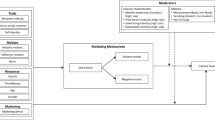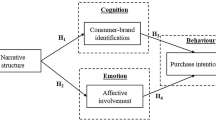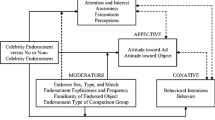Abstract
We examine whether the unethical actions of marketplace brands (e.g., the Volkswagen emissions scandal) hurt the ethical perceptions of competing brands (e.g., Ford, BMW). Across two studies, we find evidence for this unethical spillover effect and show that it can negatively affect consumers’ liking and purchase intentions for a competing brand. The results show that the spillover effect (1) only occurs for similar competitors and (2) is moderated by construal level (CL). Specifically, the spillover effect is more likely to occur when consumers focus on the finer details of the unethical brand’s transgression (i.e., low CL) but not when they focus on the bigger picture of the transgression (i.e., high CL). Thus, while it is intuitively appealing to assume that brands may benefit from a competitor’s foible, this research indicates that competitors may be hurt by a similar brand’s wrongdoing.


Similar content being viewed by others
References
Agerström, J., & Björklund, F. (2009). Moral concerns are greater for temporally distant events and are moderated by value strength. Social Cognition, 27(2), 261–282.
Ahluwalia, R., Burnkrant, R. E., & Unnava, H. R. (2000). Consumer response to negative publicity: the moderating role of commitment. Journal of Marketing Research, 37(2), 203–214.
Aron, A., Aron, E. N., & Smollan, D. (1992). Inclusion of other in the self scale and the structure of interpersonal closeness. Journal of Personality and Social Psychology, 63(4), 596–612.
Autolist. (2016). The people vs. VW. Retrieved May 18, 2016, from https://www.autolist.com/volkswagen-jetta-boston-ma#section=vw-consumer-survey
Bergkvist, L. (2015). Appropriate use of single-item measures is here to stay. Marketing Letters, 26(3), 245–255.
Bergkvist, L., & Rossiter, J. R. (2007). The predictive validity of multiple-item versus single-item measures of the same constructs. Journal of Marketing Research, 44(2), 175–184.
Borah, A., & Tellis, G. J. (2016). Halo (spillover) effects in social media: do product recalls of one brand hurt or help rival brands? Journal of Marketing Research, 53(2), 143–160.
Brinol, P., Rucker, D. D., Tormala, Z. L., & Petty, R. E. (2004). Individual differences in resistance to persuasion: the role of beliefs and meta-beliefs. In E. S. Knowles & J. A. Linn (Eds.), Resistance and persuasion (pp. 83–104). Mahwah: Erlbaum.
Brunk, K. H. (2012). Un/ethical company and brand perceptions: conceptualising and operationalising consumer meanings. Journal of Business Ethics, 111(4), 551–565.
Clinch, M. (2015). Europe’s carmakers caught up in VW storm. CNBC. Retrieved May 16, 2016, from http://www.cnbc.com/2015/09/24/bmw-shares-slip-on-report-of-high-emission-levels.html.
Creyer, E. H., & Ross, W. T., Jr. (1996). The impact of corporate behavior on perceived product value. Marketing Letters, 7(2), 173–185.
Eyal, T., Liberman, N., & Trope, Y. (2008). Judging near and distant virtue and vice. Journal of Experimental Social Psychology, 44(4), 1204–1209.
Folkes, V. S., & Kamins, M. A. (1999). Effects of information about firms’ ethical and unethical actions on consumers’ attitudes. Journal of Consumer Psychology, 8(3), 243–259.
Fujita, K., Trope, Y., Liberman, N., & Levin-Sagi, M. (2006). Construal levels and self-control. Journal of Personality and Social Psychology, 90(3), 351–367.
Gong, H., & Medin, D. L. (2012). Construal levels and moral judgment: some complications. Judgment and Decision Making, 7(5), 628–638.
Hayes, A. F. (2013). Introduction to mediation, moderation, and conditional process analysis: a regression-based approach. New York: Guilford.
Hong, J., & Lee, A. Y. (2010). Feeling mixed but not torn: the moderating role of construal level in mixed emotions appeals. Journal of Consumer Research, 37(3), 456–472.
Janakiraman, R., Sismeiro, C., & Dutta, S. (2009). Perception spillovers across competing brands: a disaggregate model of how and when. Journal of Marketing Research, 46(4), 467–481.
Klein, J., & Dawar, N. (2004). Corporate social responsibility and consumers’ attributions and brand evaluations in a product–harm crisis. International Journal of Research in Marketing, 21(3), 203–217.
Lammers, J. (2012). Abstraction increases hypocrisy. Journal of Experimental Social Psychology, 48(2), 475–480.
Magnusson, P., Krishnan, V., Westjohn, S. A., & Zdravkovic, S. (2014). The spillover effects of prototype brand transgressions on country image and related brands. Journal of International Marketing, 22(1), 21–38.
Matthews, C., & Gandel, S. (2015). The 5 biggest corporate scandals of 2015. Fortune. Retrieved April 18, 2016, from http://fortune.com/2015/12/27/biggest-corporate-scandals-2015/.
Nenkov, G. Y. (2012). It’s all in the mindset: effects of varying psychological distance in persuasive messages. Marketing Letters, 23(3), 615–628.
Roehm, M. L., & Tybout, A. M. (2006). When will a brand scandal spillover, and how should competitors respond? Journal of Marketing Research, 43(3), 366–373.
Schultz, E. J. (2015). Volkswagen brand takes image hit as emission scandal grows. Advertising Age. Retrieved May 16, 2016, from http://adage.com/article/cmo-strategy/volkswagen-brand-takes-image-hit-emissions-scandal-grows/300486/.
Septianto, F., & Pratiwi, L. (2016). The moderating role of construal level on the evaluation of emotional appeal vs. cognitive appeal advertisements. Marketing Letters, 27(1), 171–181.
Shing, E. (2015). Volkswagen emissions scandal is a boom for the BMW investor. International Business Times. Retrieved May 17, 2016, from http://www.ibtimes.co.uk/edmund-shing-volkswagen-emissions-scandal-boon-bmw-investor-1521471.
Trope, Y., & Liberman, N. (2003). Temporal construal. Psychological Review, 110(3), 403–420.
Trope, Y., & Liberman, N. (2010). Construal-level theory of psychological distance. Psychological Review, 117(2), 440–463.
Trump, R. K. (2014). Connected consumers’ responses to negative brand actions: the roles of transgression self-relevance and domain. Journal of Business Research, 67(9), 1824–1830.
Trump, R. K., Connell, P. M., & Finkelstein, S. R. (2015). Dissociation from beloved unhealthy brands decreases preference for and consumption of vegetables. Appetite, 92, 192–199.
Vanhamme, J., Swaen, V., Berens, G., & Janssen, C. (2015). Playing with fire: aggravating and buffering effects of ex ante CSR communication campaigns for companies facing allegations of social irresponsibility. Marketing Letters, 26(4), 565–578.
Williams, C. (2015). Ford to benefit from VW scandal, says chairman. The Telegraph. Retrieved May 16, 2016, from http://www.telegraph.co.uk/finance/newsbysector/industry/11980947/Ford-to-benefit-from-VW-scandal-says-chairman.html.
Wright, S., Manolis, C., Brown, D., Guo, X., Dinsmore, J., Chiu, C. Y. P., & Kardes, F. R. (2012). Construal-level mind-sets and the perceived validity of marketing claims. Marketing Letters, 23(1), 253–261.
Acknowledgments
This research was supported by a summer research grant from the Sellinger School of Business and Management at Loyola University Maryland and a summer research grant from the School of Business at Providence College. The authors thank Scott Wright for his thoughtful comments.
Author information
Authors and Affiliations
Corresponding author
Rights and permissions
About this article
Cite this article
Trump, R.K., Newman, K.P. When do unethical brand perceptions spill over to competitors?. Mark Lett 28, 219–230 (2017). https://doi.org/10.1007/s11002-016-9409-y
Published:
Issue Date:
DOI: https://doi.org/10.1007/s11002-016-9409-y




